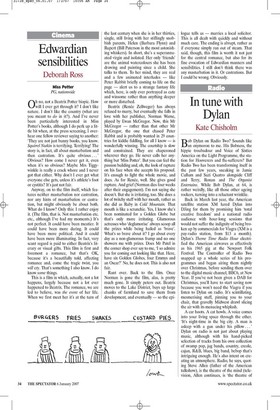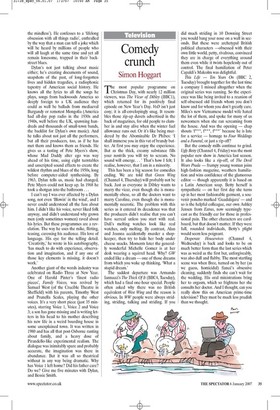In tune with Dylan
Kate Chisholm Bob Dylan on Radio Two? Sounds like an oxymoron to me. His Bobness, the hippie troubadour and Voice of Sixties America on the Light Programme, the station for Hooverers and flu-sufferers? But Radio Two has been transforming itself in the past few years, sneaking in Jamie Cullum and Suzi Quatro alongside Cliff and Terry, Ronan and The Organist Entertains. While Bob Dylan, at 64, is rather weirdly, like all those other ageing rockers, turning into a reluctant wrinklie Back in March last year, the American satellite station XM lured Dylan into DJing for them by promising him 'total creative freedom' and a national radio audience with hour-long sessions that would not suffer the indignity of being broken up by commercials for Viagra (XM is a pay-radio station, from $13 a month). Dylan's Theme Time Radio Hour electrified the American airwaves as effectively as his 1965 gig at the Newport Folk Festival. The Controller of Radio Two snapped up a whole series of his programmes and began airing them nightly over Christmas, before sending them over to the digital music channel, BBC6, at New Year. If you've not been given a DAB for Christmas, you'll have to start saving now because you won't need the Viagra if you listen to Dylan on radio. It's scintillating, mesmerising stuff, pinning you to your chair, that gravelly Midwest drawl slicing the air with its menacing whiplash.
A car hoots. A cat howls. A voice comes into your living space through the ether. 'It's night-time in the big city. A man is asleep with a gun under his pillow. ... ' Dylan on radio is not just about playing music, although with his hand-picked selection of tracks from his own collection of swamp pop, jug bands, country, creole, cajun, R&B, blues, big band, bebop that's intriguing enough. He's also intent on creating an atmosphere. Radio, he says, quoting Steve Allen (father of the American talkshow), is the theatre of the mind (television, Allen continues, is 'the theatre of the mindless'). He confesses to a 'lifelong obsession with all things radio', enthralled by the way that a man can tell a joke which will be heard by millions of people who will all laugh at the same time and yet all remain lonesome, trapped in their backstreet blues.
Dylan's not just talking about music either; he's creating documents of sound, snapshots of the past, of long-forgotten lives and hidden tragedies, a radiophonic tapestry of American social history. He knows all the lyrics to all the songs he plays, songs from backwoods America so deeply foreign to a UK audience they could as well be ballads from mediaeval Burgundy or remotest Mongolia (America had all-day pop radio in the 1930s and 1940s, well before the UK, spawning hundreds and thousands of small-town bands, the backlist for Dylan's own music). And he talks about not just all the performers, but all their producers, too, as if he has met them and knows them as friends. He gives us a tasting of Pete Myers's show, whose Mad Daddy alter ego was way ahead of his time, using eight turntables and unscripted sound effects to create the wildest rhythm and blues of the 1950s, long before computer-aided synthesising. By 1963, Dylan tells us, music had changed, Pete Myers could not keep up. In 1968 he took a shotgun into the bathroom ...
I can't say I was ever affected by a Dylan song, not even `Blowin' in the wind', and I never could understood all the fuss about him I didn't like his voice, never liked folk anyway, and didn't understand why grown men (only sometimes women) raved about his lyrics. But these programmes are a revelation. The way he uses the mike, flirting, teasing, caressing his audience. His love of language. His eye for the telling detail. 'Creativity,' he wrote in his autobiography, 'has much to do with experience, observation and imagination, and if any one of those key elements is missing, it doesn't work.'
Another giant of the words industry was celebrated on Radio Three at New Year. One of Harold Pinter's 'finest radio pieces', Family Voices, was revived by Samuel West (of the Crucible Theatre in Sheffield) with his parents, Timothy West and Prunella Scales, playing the other voices. It's a very short piece (just 35 minutes), starring Voice 1, Voice 2 and Voice 3; a son has gone missing and is writing letters in his head to his mother describing his new life in a weird boarding house in some unexplained town. It was written in 1980 and has all that post-Osborne ranting about family, and a heavy dose of Pirandello-like experimental realism. The dialogue was inimitably spare and probably accurate, the imagination was there in abundance. But it was all so theatrical without in any way being dramatic. Why has Voice 1 left home? Did his father care? Do we? Give me five minutes with Dylan, and Bessie Smith.





































 Previous page
Previous page